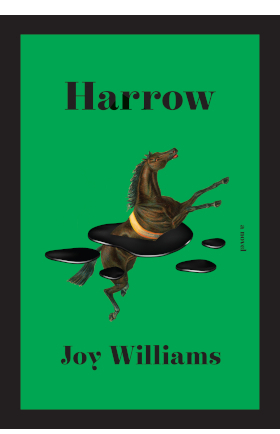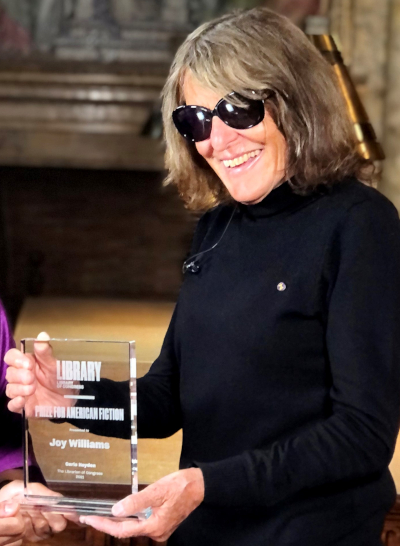
Reflections on Vancouver, British Columbia and other topics, related or not
Polluted purgatory
Lost souls wander the dead planet
of Joy Williams’ climate change fantasy
Greg Klein | January 21, 2022
Joy Williams at age 77 receives a 2021 U.S. Library of Congress
award. Harrow, her first novel in 20 years, assumes our
society will last long enough to obliterate nature.
Humanity responded to the collapse with vengeance.
“All that is non-human is considered detrimental to the future,” explains one of the less-befuddled oldsters dedicated to the collapse recovery’s collapse. “All conservation attempts are considered reactionary. Any suggestion to repair or renew our relationship with nature is perceived as an attempt to exploit a crisis. People think the planet is attempting to make threats—the withdrawal of spring—and nonnegotiable demands, and it pisses them off.”
Imagine such retribution: the planet stinting humanity on spring, the time of rebirth and renewal. But it’s not so much the seasons, let alone the ever-darkening sky, that demonstrate Earth’s rebellion. Mostly it’s water. The regime might blame H2O’s sorry state on the planet but Earth’s aquifers, streams, rivers, lakes, seas and smoking oceans suffer from heedless humanity. The womb of nature, the sustenance of life, cleansing, rebirth and renewal has all but packed it in, sick to death of humanity’s shit and abuse.
One example shows how a character inadvertently became cured of her repetitive ritual compulsion:

“Her baptism in a river, which she had so excitedly anticipated, proved to be her last, however, when she found she simply could not ignore the scrap of turquoise carpet floating past, the snaggle of brush and rope and plastic jugs, even a ragged fleecy leg pointing straight to heaven.”
Circumstances might thwart spiritual realization but the supplicants leave much to be desired. Confusion abounds in this world of geriatric militants, absent fathers, lunatic mothers, indoctrinated citizens, a couple of deeply cynical young men, a 10-year-old boy of weird sagacity and a teen girl seeker.
If there was promise, it might have been with the latter two. But that was not to be. Maybe the seeker will pair up with the cynic, the one who didn’t snuff it through drugs and disgust. The story teases that possibility with cryptic references to a common past, leaving open the possibility of renewal after all—cycles of renewal, even if the regime insists that it’s triumphed over such dangerous anachronisms.
Yes, triumphed over nature. What better reaction to the environmental end time than to end the environment?
The regime’s symbol, the sole object permitted for depiction, is a machine that tears up the earth and human dissidents too. And then, it turns out, the harrow also chews up those who conform to it.
Existence, in this polluted purgatory between life and death, matches the murky waters. Biblical references proliferate, especially the Old Testament and repeated mention of the Ark, sometimes drifting aimlessly for lack of spiritual landfall, or carried by children for lack of buoyant elements. The theme continues with labourious interpretations of a Kafka story about a directionless boat ferrying a man trapped between life and death.
Characters express themselves through surreal dialogues, metaphysical confusion, sardonic remarks and snarky cleverness. Occasional snatches of insight break through their madness or cynicism, but to no avail.
It’s a story of doom, not just of the environment but of the soul. Harrow is perplexing, sometimes incomprehensible, and although there are clues they can get tedious. Written with certainty that our society will last long enough to eradicate nature, the story itself remains as murky as the waterways depicted.
Even so, familiar reflections sometimes appear.
